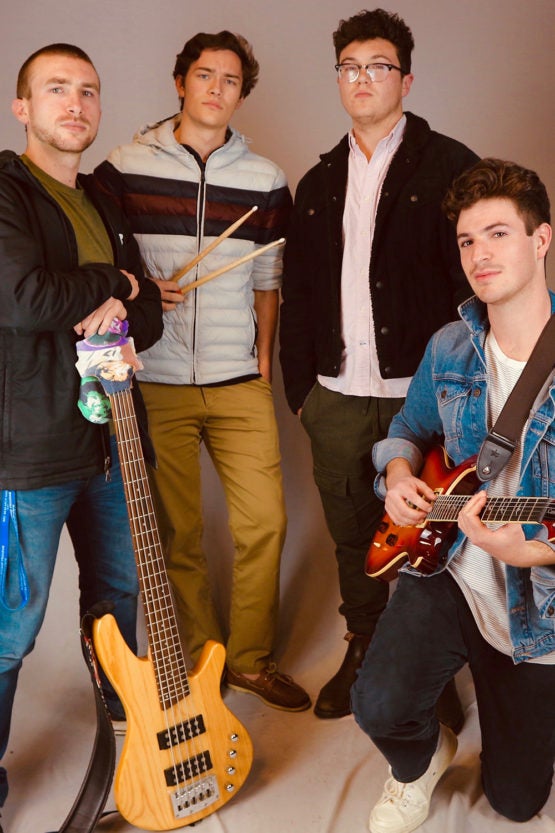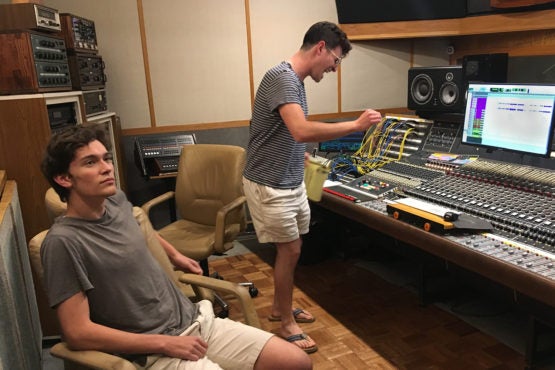Over the last year and a half, indie rock band Pass By Catastrophe has made a name for itself in the Stanford music scene with live performances across campus. Now the group is expanding the reach beyond the Farm with the recently released, self-titled debut EP, which was recorded at one of the Bay Area’s most historic recording studios.

Stanford student band Pass By Catastrophe released their self-titled debut EP on Oct. 4. (Image credit: Courtesy Pass By Catastrophe)
Before the EP, the band had only produced demos, so recording its music professionally was a major milestone for the student musicians.
“These songs really took on a new life in the studio,” said guitarist, songwriter and economics major Max Kilberg, ’21. “It’s so cool to think that what started as a random melody in my head can become an actual song that people can hear and share with one another, which is just the most wild and cool thing.”
In June, Kilberg and his bandmates – lead singer and film major Dexter Simpson, ’21, drummer and communication major Sam Silverman, ’21, and multi-instrumentalist Zach Plante, a research assistant at Stanford Earth – recorded their EP, which is essentially a short album, at Hyde Street Studios in the heart of downtown San Francisco. They considered other studios, but after visiting Hyde Street’s facilities, meeting its staff and learning about its history and contributions to the music industry, they knew instantly that it was the right place to record.
“We sort of fell in love with the place, the vibe and all the people who had recorded there before us,” Kilberg said.
Opened in 1969 as Wally Heider Studios, the establishment became Hyde Street Studios in 1980. Over the decades, some of the biggest names in music have recorded there, from the Grateful Dead and Santana to Green Day and Kanye West. When it was their turn to step into the recording booth, Pass By Catastrophe’s members quickly learned how collaborative the recording process is with other creative professionals, including producers, audio engineers and mixers.
Collaborative process
“You have to trust that everyone really cares a lot about the music and wants to make it better,” Kilberg said. “I think we’re all very proud of what we were able to accomplish through what was sometimes a very chaotic, but ultimately very rewarding process.”

Sam Silverman and Max Kilberg working at Hyde Street Studios in San Francisco. (Image credit: Courtesy Pass By Catastrophe)
The band members describe their style as indie rock with a classic feel. Their music is heavily influenced by British rock bands of the 1960s and ’70s and by American artists like Bruce Springsteen and Tom Petty. The band members said they also gather inspiration from jazz, funk and Motown musicians.
“There’s a little bit of everything on the EP,” Kilberg said.
Production of the three-track EP was completed over the summer and released on Oct. 4. It is available on all major music streaming services.
Pass By Catastrophe formed organically through the members’ shared love for music. Kilberg and Simpson met their frosh year when they lived on the same floor in Twain and started jamming together. It was at a concert on campus where Kilberg met Silverman, who then introduced Plante to the group.
“Everyone just clicked instantly,” Silverman said.
The musicians started playing together and settled on the name Pass By Catastrophe. It comes from an urban academic folk legend of the same name that describes a hypothetical scenario in which a class experiences a disaster, such as an earthquake, that inhibits the completion of an exam or course.
“If the whole school crumbles then there’s no way they can facilitate the class finishing,” Plante explained. “[The school is] not going to fail the whole class, so they’re probably going to pass everyone.”
As far as the band knows, such a scenario has never happened at Stanford.
Stanford gigs
The group got its start playing gigs around campus, including Vibes and Vino, Grove and Outdoor House. While the Stanford music scene has its fair share of artists – many of them hip-hop acts – Pass By Catastrophe stands out because it’s one of only a handful of rock bands. But Silverman also credits the originality of the band’s songs for helping garner support.
“The quality of our songwriting is what enabled us to have this success and stand out on campus,” he said. “Now we’re in demand for all these gigs around campus, and it’s partly because of the EP, but it’s also because of the quality of the musicianship that we bring to the table.”
When they’re not tending to their school obligations, Pass By Catastrophe is working on promoting the EP. The group members recently performed live on KZSU and plans to take their act around the Bay Area, including other colleges and universities.
“Our focus is going to shift more to shows in winter and spring quarters, and a big component of those is going to be off-campus,” Plante said.
The musicians said they were grateful for the opportunity to work at a historic facility like Hyde Street Studios, and they hope to record professionally again in the future.
“At the end of the day we’re just some kids who knew how to play their instruments,” Kilberg said. “But we really did need the guidance of [our producer] and the studio.”
Information about Pass By Catastrophe and their upcoming performances is available on the group’s Facebook, Instagram and Spotify pages.
